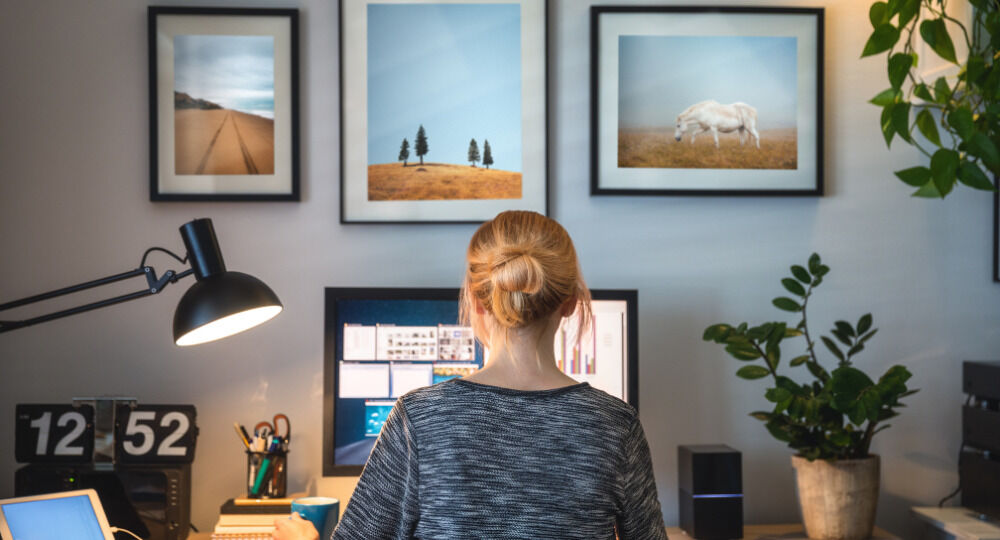Working from home has become common in the past few years. Many people love the flexibility, freedom, and time it gives them in their lives. However, as anyone who works from home can tell you, there are downsides, including feelings of loneliness, low mood, and an increase in anxiety. If you are struggling to cope with the shift from working in an in-person setting to working at home, you are not alone. Let’s discuss some of these difficulties and some coping strategies that might be helpful.
Let’s start by noticing a few key differences between working in-person and working from home by depicting a typical Monday morning for a woman named Kathy who works in an office. Kathy races out of the house, dropping off the kids and grabbing a cup of coffee on her commute to work. She might listen to a podcast or turn up the volume on her favorite song as she thinks about the day ahead. She takes her steaming cup of coffee and walks to her desk to start work. She may pass a few co-workers who call out to her and ask about her weekend. Someone might come by her desk in the middle of her first sip and tell her a funny story. Although Kathy might see this as just a regular workday, in this short period of time, several mental health needs have been met. Kathy has had a chance to shift from being in “home mode” or shift from her role as a parent or partner into “work mode.” She has had the chance to mentally begin preparing for her day and what is ahead. She’s also had an opportunity for some social interaction and relationship development with those around her. It’s easy to see how these small interactions can begin to add up to something valuable and meaningful over time.
By contrast, when you are working from home, it is more difficult to develop deeper friendships with co-workers, leading to feelings of loneliness, isolation, and that “Groundhog Day” sense that every day is the same. Many times, before or after an in-person meeting, people will spend a few minutes catching up with one another. Unfortunately, in a work from home environment, most people click off the Zoom or Teams meeting right when it’s finished. Many feel it’s more difficult to share personal thoughts and feelings with a co-worker in an online environment. This can add up to a lack of social interaction that leads to feelings of loneliness and isolation. If you are working from home, you may want to consider seeing a therapist to talk through ways to increase your social interactions, as they are imperative to your mental health.
Another huge hurdle in working from home is coping with the lack of natural transition time. A person working from home goes right from “home mode” to “work mode” without any time in between. We sometimes take for granted how important transition time is in our daily lives. Transition time from one area of our lives to another area is vital for our mental health. Shifting from our roles in “home mode” (friend, parent, partner) to our roles in “work mode” can be tough. As one parent recently said, “I miss that 20-minute commute to just clear my head.” Time between roles in our lives helps us process the role we are leaving and begin thinking about the role ahead. In the above example, Kathy had time to begin thinking about her day at work as she drove to work on Monday. This commute time gives her a chance to put away her mental thoughts about her personal life and begin shifting her thoughts to work. This same process happens at the end of Kathy’s day and is even more crucial for her mental health. On her commute home, she will have a chance to put away any stress or worries at work and begin thinking about her personal life away from work. This transition time can reduce anxiety and stress and provide balance in our lives.
Working from home can have a potentially negative impact on your relationship as well. You might think, “If we’re both working from home, it will strengthen our relationship,” but often the opposite is true: You may feel less connected to or seen by your partner than you did when you both worked outside the home. The inability to have space and time away from each other may make it more difficult to value and appreciate your time together when you’re not working. It’s also difficult to feel like your partner is making time for you or that you are important to them, since much of your time together will be focused on meeting separate work goals and not on each other’s needs. When both members of a couple work from home, they may also compare their work role to that of their partner and feel insignificant or jealous. If your partner’s role has a great deal of freedom and flexibility and your role is more limited, it can be difficult to work side by side and face these differences daily. In addition, if one partner goes into work and one partner works from home, many times the partner who works at home ends up with more home responsibilities, leading to frustration and resentment.
If you and your partner are experiencing more conflict or a decreased sense of connection, it might just be related to these sorts of issues. Couples counseling can be extremely helpful to assist in changing these dynamics at play in your relationship. By working with a couples counselor to learn and use better communication skills, you and your partner can begin to feel more connected and in tune with one another’s needs.
If you or your partner are working from home, you may have experienced an increase in feelings of loneliness, isolation, sadness, boredom, or anxiety, or you may find you are having more frequent issues in your relationship. You are not alone. Working from home requires additional focus on your mental health needs. Counseling can be invaluable in this new era of working from home, helping you improve your mood, lower your anxiety, find ways to increase social interaction, learn to transition from “home mode” to “work mode,” and increase communication with your partner.



